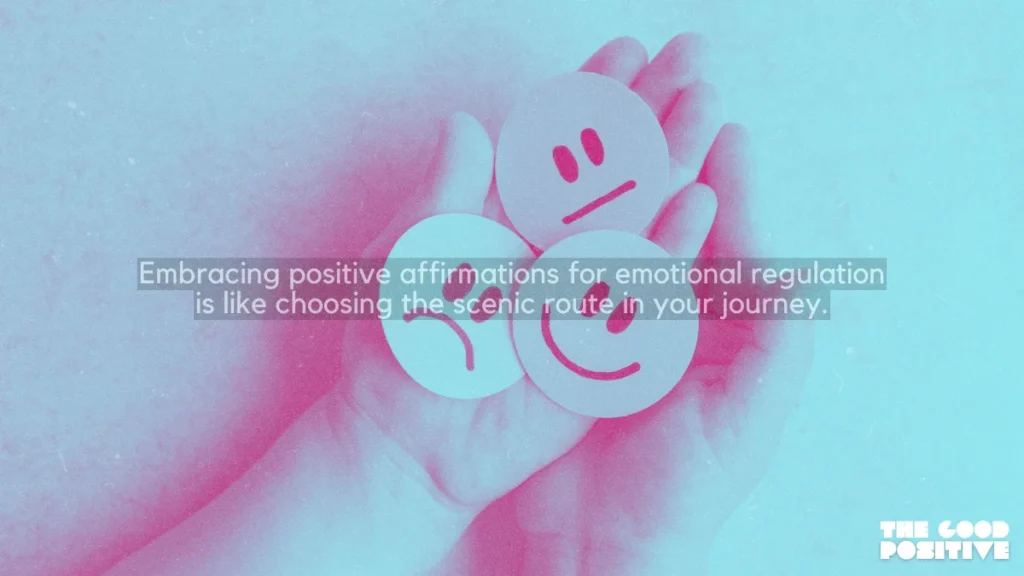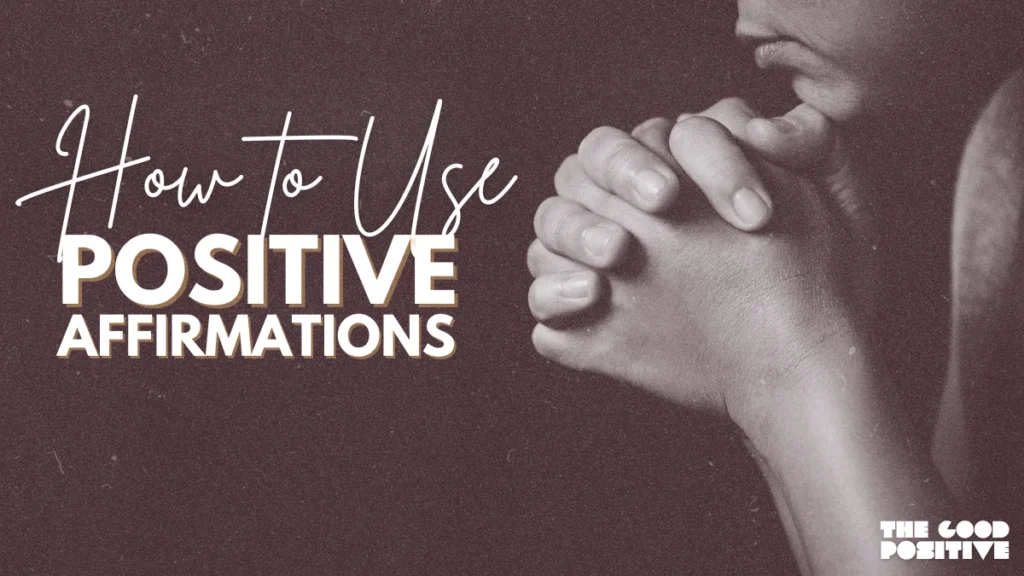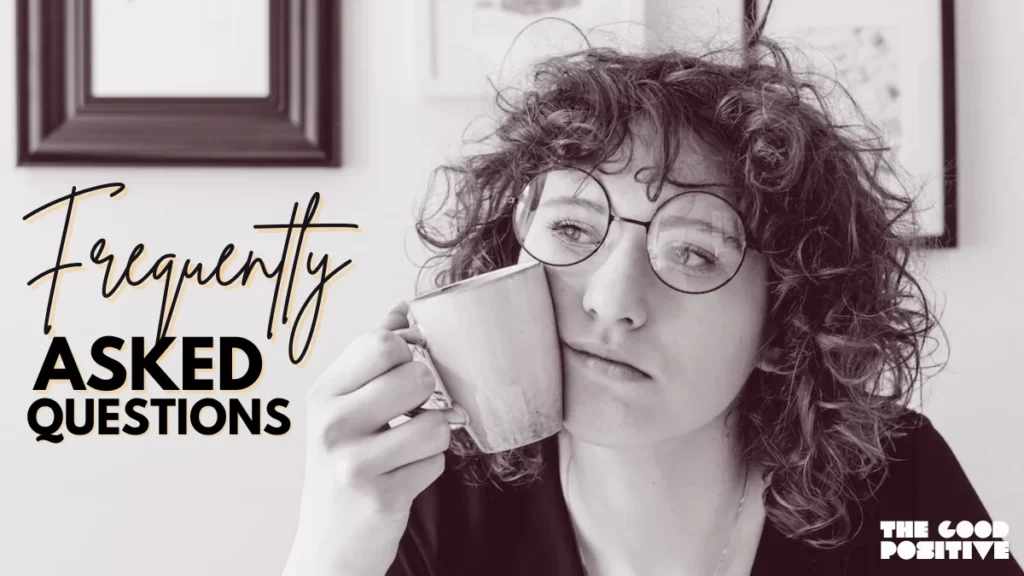Positive Affirmations for Emotional Regulation can be your secret garden, a serene place you visit to nurture your mind’s resilience and balance your heart’s tumultuous seas.
Picture this: each affirmation, a seed of calm planted in the fertile soil of your consciousness, gradually blossoming into a vibrant, unwavering peace that withstands life’s unpredictable storms.
As we journey through the twists and turns of our emotional landscapes, these affirmations serve as gentle reminders that our feelings are valid, manageable, and, most importantly, navigable.
Welcome to a journey where each step is a promise of emotional steadiness, whispered to the soul with love and care.
Table of Contents
Affirm More: Positive Affirmations for Emotional Healing.
Why Use Positive Affirmations for Emotional Regulation?

Imagine you’re embarking on a quest, much like Frodo in “The Lord of the Rings,” where instead of a ring, your mission is to master the art of emotional regulation.
On this journey, your companions are Positive Affirmations, those small but mighty phrases that, when wielded wisely, have the power to transform.
The Maya Angelou Effect: Just as Maya Angelou spun words into hope and resilience, affirmations help us narrate our own story of strength, enabling us to face the Saurons of stress and anxiety with grace.
The Michael Phelps Lap: Consider how Michael Phelps visualizes each race before diving in. Affirmations are your mental rehearsal for life’s challenges, preparing you to swim through emotional waves with Olympic calm.
The Oprah Winfrey Book Club: Oprah, who turned personal struggle into empowerment for millions, shows us the power of positive narratives. Affirmations are like having Oprah in your corner, cheering you on to see the possibility in every challenge.
Embracing positive affirmations for emotional regulation is like choosing the scenic route in your journey.
Each affirmation is a step, a breath, a moment of choosing who you want to be amidst the chaos of feeling. It’s your story, narrated by you, powered by the quiet strength of your chosen words.
100 Positive Affirmations For Emotional Regulation

Embark on a journey through the tapestry of your emotions with “100 Positive Affirmations for Emotional Regulation.”
Think of this as your personal treasure map, leading to hidden springs of peace and resilience within you. Each affirmation is a step towards mastering the art of calm in the eye of life’s storms.
So, why not bookmark this page now? 🔖 Commit to reciting these affirmations daily for 21 days. It’s more than a habit; it’s a voyage to the heart of your inner strength.
Let the adventure begin!
1. “I am in control of my emotions, not the other way around.”
2. “My thoughts are the architects of my emotional regulation.”
3. “I choose to respond with calm and stability.”
4. “Peace flows through my body, easing stress.”
5. “Every day, I manage my emotions with grace.”
6. “I have the power to direct the course of my life.”
7. “My actions reflect thoughtful feelings and emotions.”
8. “I embrace positive thoughts that nourish my mental health.”
9. “Self-regulation is my key to a balanced life.”
10. “I focus my energy on growth and self-awareness.”
11. “Empathy guides my interactions and strengthens my relationships.”
12. “I allow myself to experience emotions without letting them control me.”
13. “My mood is a reflection of my discipline and self-control.”
14. “I learn and expand from every experience, even the difficult ones.”
15. “Challenging situations are opportunities for emotional and personal growth.”
16. “I approach social interactions with confidence and self-discipline.”
17. “My reactions to setbacks are balanced and measured.”
18. “I am committed to achieving my goals with emotional intelligence.”
19. “I have the skills to meet life’s demands with a calm mind.”
20. “My strategies for emotional regulation are effective and empowering.”
21. “Every breath I take fills me with peace and focus.”
22. “I possess the techniques to navigate through stress with ease.”
23. “My mind is a sanctuary of calm and positivity.”
24. “I acknowledge my feelings without letting them overpower me.”
25. “I am the master of my emotional state.”
26. “Stability in my emotions leads to clarity in my actions.”
27. “I nurture my body and mind with self-care and kindness.”
28. “My approach to life is grounded in understanding and empathy.”
29. “I am resilient in the face of emotional challenges.”
30. “Every day, I enhance my emotional regulation skills.”
31. “I transform setbacks into stepping stones for growth.”
32. “My self-discipline in managing emotions paves the way for happiness.”
33. “I cultivate a stable and positive environment for myself and others.”
34. “I am empowered by my ability to adapt to emotional demands.”
35. “The power of emotional regulation enhances my relationships.”
36. “I maintain a peaceful mind even in challenging situations.”
37. “My emotional health is a priority that I nurture daily.”
38. “I am equipped with strategies to handle stress and anxiety.”
39. “My capacity for empathy enriches my social interactions.”
40. “I control my mood through conscious thought and action.”
41. “Personal growth is the result of my consistent self-discipline.”
42. “I welcome difficult experiences as catalysts for emotional strength.”
43. “My social skills are refined through self-awareness and empathy.”
44. “Reacting with calmness is my natural response to setbacks.”
45. “I am focused on achieving my goals with emotional resilience.”
46. “My emotional regulation skills bring balance to my life.”
47. “Challenges are met with strategies that foster stability and peace.”
48. “I manage life’s demands with a clear and focused mind.”
49. “Every technique I learn enhances my ability to regulate emotions.”
50. “My mind is a garden where peace and positivity flourish.”
51. “I am kind to myself and understand my emotional needs.”
52. “My journey is marked by growth in emotional intelligence.”
53. “I handle hurt with grace, allowing for healing and understanding.”
54. “I am a beacon of stability for myself and those around me.”
55. “My actions are guided by thoughtful consideration of my feelings.”
56. “I am the architect of my emotional well-being.”
57. “Stress is a signal for me to focus on balance and calm.”
58. “I manage my emotions with techniques that bring tranquility.”
59. “My relationship with myself is based on understanding and kindness.”
60. “I approach emotional regulation with confidence and self-assuredness.”
61. “I embrace the power within me to maintain a positive outlook.”
62. “My self-awareness is the compass that guides my emotions.”
63. “I cultivate an environment of peace and emotional stability.”
64. “Every day is an opportunity to practice self-regulation and growth.”
65. “I am mindful of my emotional triggers and respond with calm.”
66. “My focus on mental health is unwavering and prioritized.”
67. “Empathy is the bridge that connects me to others’ experiences.”
68. “I navigate my feelings with precision and gentle awareness.”
69. “My mood reflects the peace and balance I cultivate within.”
70. “Self-discipline in emotional regulation is my path to freedom.”
71. “I grow stronger with each difficult situation I encounter.”
72. “Social interactions are enhanced by my emotional intelligence.”
73. “I respond to emotional challenges with resilience and wisdom.”
74. “Setbacks are temporary; my emotional regulation skills are lasting.”
75. “I set and achieve goals with a calm and focused demeanor.”
76. “My skills in managing demands are honed through practice and patience.”
77. “Challenging moments are met with advanced strategies for peace.”
78. “Techniques for emotional regulation are integral to my daily routine.”
79. “My mind is attuned to the rhythms of calmness and serenity.”
80. “Acknowledging my emotions allows me to steer them positively.”
81. “I am a champion of my emotional well-being and stability.”
82. “The balance I maintain between thought and feeling is exquisite.”
83. “I nourish my body with actions that support emotional health.”
84. “Understanding and managing my emotions is a rewarding journey.”
85. “I face emotional challenges with courage and positive strategies.”
86. “Every breath is an opportunity to regulate and balance my emotions.”
87. “I am in harmony with the natural flow of my feelings.”
88. “My commitment to emotional regulation is unwavering and passionate.”
89. “I use my power of focus to maintain mental and emotional well-being.”
90. “Self-awareness is the key that unlocks my emotional potential.”
91. “Empathy for myself and others deepens my relationships and happiness.”
92. “I gently navigate my way through hurt with understanding and care.”
93. “My mood is a reflection of my inner peace and stability.”
94. “Self-discipline is my ally in navigating the seas of emotional growth.”
95. “With each experience, I build my resilience and emotional intelligence.”
96. “Difficult situations are navigated with grace, thanks to my emotional skills.”
97. “In social settings, my calmness and empathy shine through.”
98. “I master my reactions to ensure they align with my values.”
99. “Emotional setbacks are but a pause, a moment for growth and reflection.”
100. “I am on a lifelong quest for emotional regulation, equipped with the skills for a fulfilling journey.”
How to Use Positive Affirmations for Emotional Regulation?

Imagine you’re a gardener, and your mind is a garden. Positive affirmations are the seeds you plant to grow a landscape of tranquility and strength.
Here’s how to cultivate your garden in five essential steps:
1. Morning Ritual: Begin your day by watering these seeds. Stand in front of a mirror, look into your own eyes, and declare your affirmations with conviction. It’s like telling the sun to rise within you.
2. Pocket Pebbles: Write your affirmations on small pieces of paper or pebbles. Keep them in your pocket. Throughout the day, when your hand finds a pebble, let it remind you to pause and repeat your affirmation, grounding you like the earth under your feet.
3. Visual Cues: Place sticky notes with affirmations in places you often glance at – your laptop, the fridge, or the bathroom mirror. Each note is a leaf, offering shade and comfort on your journey.
4. Breath of Fresh Air: Incorporate affirmations into your breathing exercises. With every inhale, imagine drawing in strength from the universe; with every exhale, whisper your affirmation into being.
5. Nighttime Reflection: Before sleep, reflect on your day. Recite your affirmations as lullabies, letting them be the soothing night breeze that carries you into dreams.
How to Write Affirmations for Emotional Regulation?
Crafting affirmations is like writing love letters to your soul. Keep them:
- Positive and Present Tense: Speak as if it’s happening now, filling your words with hope and immediacy.
- Personal and Powerful: Tailor them to your journey, making sure they resonate with your innermost desires and strengths.
- Simple and Sincere: Complexity doesn’t equate to effectiveness. A few heartfelt words can move mountains within you.
Remember, your mind’s garden thrives on consistency and belief. Water it daily with positive affirmations, and watch as your emotional landscape transforms, blooming into resilience and peace.
FAQ’s

-
What is emotional affirmation?
Emotional affirmation is the practice of using positive, encouraging statements directed at oneself to support emotional well-being and resilience. It’s like giving your mind a pep talk, reinforcing strength, and fostering a positive mindset to navigate life’s ups and downs.
-
What are the 5 emotion regulation strategies?
The five emotion regulation strategies include: 1) Reappraisal, looking at situations from a different, more positive perspective; 2) Suppression, controlling the outward expression of emotions; 3) Avoidance, staying away from situations that trigger negative emotions; 4) Problem-solving, directly addressing the cause of the emotion; and 5) Acceptance, acknowledging emotions without judgment.
-
What causes poor emotional regulation?
Poor emotional regulation can stem from a variety of factors, including stress, lack of sleep, unresolved trauma, or mental health conditions such as anxiety or depression. It’s often a combination of environmental stressors and personal vulnerabilities that disrupt one’s ability to manage emotions effectively.
-
How do I learn to regulate my emotions?
Learning to regulate your emotions involves developing self-awareness, practicing mindfulness, and adopting healthy coping mechanisms like deep breathing or meditation. It also means recognizing your triggers and working through them with strategies like cognitive restructuring or seeking support from a therapist.
-
What are the three types of emotion regulation?
The three types of emotion regulation include: 1) Intrinsic regulation, which involves managing your own emotions internally; 2) Extrinsic regulation, which involves seeking external support to help manage emotions; and 3) Expressive suppression, where you consciously inhibit the expression of your emotions.
-
How can positive affirmations improve emotional regulation?
Positive affirmations can significantly improve emotional regulation by reshaping negative thought patterns into more positive, empowering beliefs. This mental shift can reduce stress, enhance self-esteem, and promote a greater sense of inner peace, making it easier to manage emotions in challenging situations.
-
What are the best affirmations for managing stress and anxiety?
“I am calm, peaceful, and unafraid.” “I choose to feel relaxed and confident.” These affirmations act like gentle whispers to your nervous system, reminding it that you’re in control and can handle life’s pressures with grace.
-
Can reciting affirmations daily help with emotional stability?
Absolutely! Think of daily affirmations as your emotional breakfast, nourishing your mind and setting a positive tone for the day. This regular practice builds mental resilience, helping you stay centered amidst life’s ups and downs.
-
How do affirmations contribute to better emotional health?
Affirmations are like seeds of positivity that, when watered daily, bloom into a garden of emotional well-being. They encourage a shift in focus from negative to positive thoughts, fostering a healthier, more optimistic mindset.
-
What role do affirmations play in controlling negative emotions?
Affirmations serve as a tool to redirect your mental traffic away from the alleyways of negativity into more serene, positive paths. They remind you of your strength and resilience, reducing the intensity of negative emotions.
-
How often should I use affirmations for effective emotional control?
For affirmations to weave their magic, consistency is key. Like brushing your teeth, making them a daily ritual, perhaps morning and night, can fortify your emotional resilience and control.
-
Are there specific affirmations that aid in overcoming feelings of sadness?
Yes, try “I embrace my feelings but also release them with love,” or “I allow joy to fill me up.” These affirmations acknowledge your feelings of sadness but also open the door for light and recovery.
-
Can positive affirmations enhance mood and mental well-being?
Indeed, they can! Positive affirmations act like sunshine for the soul, brightening your mood and cultivating a landscape of mental well-being. By repeatedly affirming your inner strength and worth, you’re essentially reprogramming your brain to focus on the positive, uplifting your spirit along the way.
-
How to create personalized affirmations for emotional regulation?
Start by reflecting on the areas of emotional regulation you’d like to improve. Craft your affirmations in the present tense, ensuring they resonate personally with you. For instance, if you’re working on anxiety, an affirmation like “I am calm and centered in the present moment” can be powerful. Remember, the more your affirmations reflect your personal aspirations and challenges, the more effective they’ll be.
-
What is the impact of positive affirmations on mental health recovery?
Positive affirmations can be a potent tool in the toolkit of mental health recovery. They encourage a shift from negative thought patterns to a more hopeful and self-compassionate mindset. This shift can significantly impact one’s journey to recovery, promoting resilience, self-esteem, and even helping to rewire the brain towards more adaptive, healthy thinking patterns.
-
What are feelings affirmations?
“I honor my feelings as guides to deeper self-understanding.”
“My emotions are valid and important.”
“I allow myself to feel and then release.”
“Every emotion I experience teaches me something valuable.” -
What are affirmations that start with “I feel”?
“I feel peace within me regardless of the external world.”
“I feel strong in my ability to overcome challenges.”
“I feel confident in my decisions and direction in life.”
“I feel grateful for the love and support that surrounds me.” -
What are affirmations for hurt feelings?
“I acknowledge my pain, but I choose healing and forgiveness.”
“I am moving beyond hurt to find my inner peace.”
“My heart is resilient and capable of healing from this hurt.”
“I give myself permission to grieve and then grow.” -
What are positive mood affirmations?
“Today, I choose joy and let it fill every moment.”
“I radiate positivity and attract good vibes only.”
“My mood is a reflection of my gratitude for life’s blessings.”
“Happiness is my choice, and I embrace it fully today.” -
What are affirmations for self-discipline?
“I have the self-discipline to reach my goals, one step at a time.”
“I control my impulses and make decisions that align with my values.”
“Every day, I am more focused and disciplined in my pursuits.”
“My self-discipline is the engine of my success.” -
What are positive affirmations for personal growth?
“I am committed to personal growth and welcome the lessons it brings.”
“Every challenge I face is an opportunity to grow and improve.”
“I trust the journey of growth, knowing each step forward enriches my life.”
“I am evolving, shedding old patterns for new, empowering ones.”
Conclusion
And there you have it, your very own compass in the quest for tranquility: positive affirmations for emotional regulation.
We penned this guide not just to share a strategy, but to hand you a key to unlock a more serene, balanced version of yourself. Each affirmation is a step on a path leading away from turmoil and towards peace.
So, as you close this tab, remember the power you wield with just a few whispered words. May your journey be light, your heart full, and your smiles frequent.
Here’s to transforming not just moments, but life itself. 😊✨
Affirm More: Positive Affirmations for Emotional Abuse survivors.

Aldvin is the proud owner of “thegoodpositive.com.” A passionate writer and supporter of body positivity. Advocate of plus-size fashion. He’s mission is to curate the latest trends and timeless fashion for plus size women. He wants to inspire confidence and creativity through fashion, helping curvy women express their unique personalities with every outfit.

